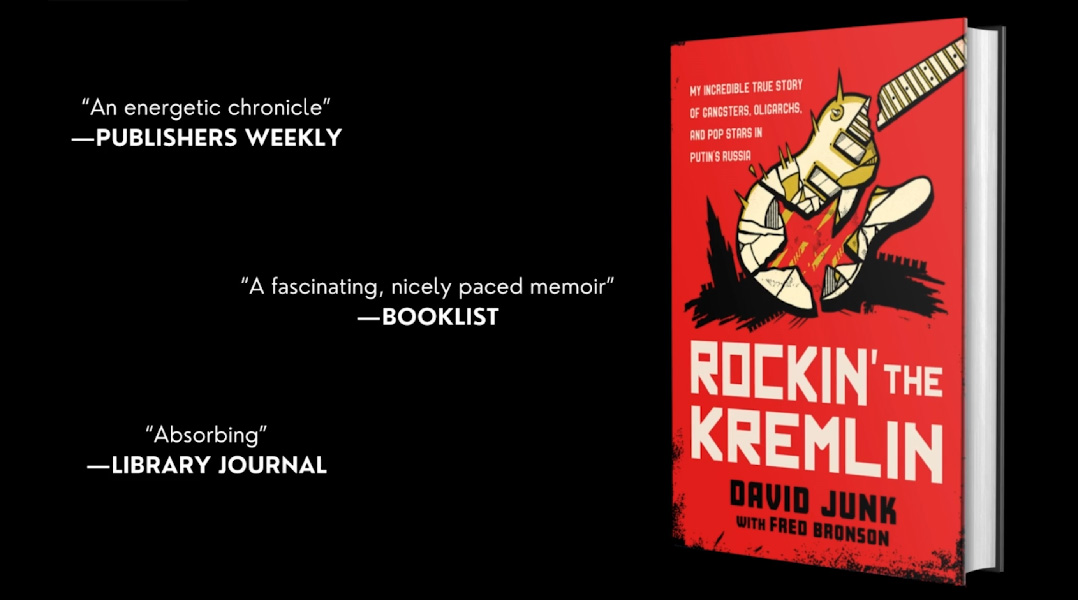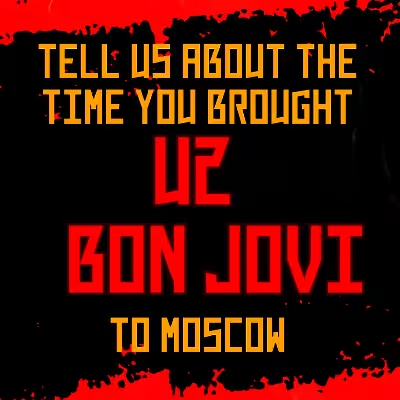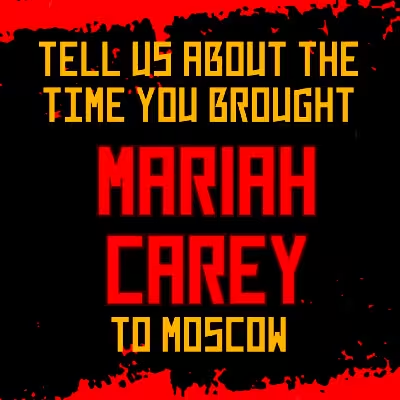
Now available as an audiobook
Rockin’ the Kremlin — Audiobook Release
David Junk’s true story of gangsters, oligarchs, and pop stars in Putin’s Russia is now available in audio — narrated by celebrated actor Christopher Ragland.
Prefer listening? This is the easiest way to experience the behind-the-scenes world of Universal Music Russia, t.A.T.u., and the superstars David brought to the former Soviet Union.
Press note: “A fast-moving, information-rich narrative…” — New York Journal of Books
My Incredible True Story of Gangsters, Oligarchs, and Pop Stars in Putin's Russia
When the Soviet Union collapsed in 1991, Russia opened its borders, and Russian audiences were hungry for Western popular music and the values it espoused. David Junk was one of the first idealistic, young Americans to seize this opportunity.
Rockin’ the Kremlin is the thrilling true story of how David became the first CEO of Universal Music Russia and built impactful cultural bridges with music—but also how that would all shatter with the rise of Vladimir Putin and invasions of Ukraine. There was no proper music industry in the USSR, and creating a modern music industry in Russia would be far more challenging than anyone had anticipated. David assembled a team of young and talented Russians, and they navigated a terrain filled with political chaos, organized crime, powerful oligarchs, bombings, and violence—with cultural clashes tinting many aspects. They captivated millions by bringing superstar acts and their music to Russia for the first time ever, including Metallica, Mariah Carey, Sting, Eminem, and Enrique Iglesias, while developing local talent such as Alsou and t.A.T.u.—Russia’s greatest selling pop act of all time. Eventually, David would even build a music industry in Ukraine and other countries in Eastern Europe.
While Russia’s descent into authoritarianism and two invasions of Ukraine have tarnished this, the industry that David shepherded has birthed a newer generation of Russian musicians who are speaking out against the war and Putin. Filled with unique insights as well as gripping—and sometimes humorous—stories, this book reveals how it all happened. Read sample
The companion soundtrack. All of these artists are referenced in the book.

"The most exciting part of my job was finding and signing Russian artists to the label and then trying to promote them nternationally." Michael Elves, interviews David on his Turning Pages podcast. It includes an interesting discussion about how Rockin' The Kremlin came to be.

"It was on my birthday and I got a telegram from the prosecutor. It said 'Come into our office!' I thought, oh boy, this is the time that they're finally going to send me away." Dave “Chachi” Denes, the president and co-founder of Benztown, interviews David and Fred on his podcast Chachi Loves Everybody.

"This is a wonderful intersection of a venn diagram of both of our interests in the Eurovision Song Contest." Ben Smith and Mike McComb, two Americans attempting to make sense of the Eurovision Song Contest, interview David and Fred about the influence of western pop culture after the fall of the USSR.

"This is a fascinating story of what it was like to work in the wild, wild East" British television presenter and screenwriter Steve Blame presents an in-depth interview with David and Fred about their new book on his Pop; The History Makers podcast.

"It's Said 'Hip Hop Can Save the World.' Can it Save Russia?" is the title of David's' opinion piece in The Moscow Times. "While most Russian musicians are silent, scared of the repercussions to their careers, some of the most courageous voices of protest come from Russia’s hip-hop community."
Read David's Moscow Times article here.
Review by Alex Beam - In “Rockin’ the Kremlin,” music executive David Junk recounts the years he spent working to bring new sounds to Russian ears. Read Alex's review here or listen to The Washington Post's AI generated audio version below.

Join Patrick Evans and Randy Florence for an enthralling episode with David and Fred as they dive into David's career transformation after answering a PolyGram Music ad, leading him to broker artists and battle the Russian mafia's counterfeit music trade.

"This story is fascinating and you are about to hear it!" Last night we talked with Fred Bronson about his latest book, Rockin’ The Kremlin.

David and Fred sat down with Fritz Coleman and Louise "Weezy" Palanker for a video podcast about Rockin' The Kremlin.
Watch the podcast on YouTube Here.
"Everybody has a story, but this man has lived the life!" David is interviewed by three time Gracie Award winner, Shelley Sunstein

David and Fred are interviewed by Adam Wurtzel, reporter on WCCB’s morning show Rising in Charlotte, N.C.
Watch the interview on WCCB's website Here.
Mark Thompson is an award winning journalist, veteran radio and TV news personality. Mark posted an interview with David on his Youtube channel.
Watch the interview on YouTube Here.
David is interviewed by Greg Berg, fine arts director for WGTD Wisconsin Public Radio. Listen as they discuss David's newly released book, Rockin' The Kremlin

Let your balalaikas ring!" David is interviewed by TJ Trout of KKOB News Radio Albuquerque, New Mexico.

"This is quite a story!" David is interviewed by Paul Miller, Morning Show host for WPHM AM Radio Port Huron, Michigan.

David and Fred are interviewed by Eric Callero, on his Vinyl Rewind YouTube channel.
Watch the interview on YouTube Here.
"I've been looking forward to this all morning!" David is interviewed by Brian Thomas, for WKRC AM Radio Cincinnati, Ohio.

"His story is not only fascinating, but it's timely..." David is interviewed by Shelley Irwin, for WGVU FM Radio Grand Rapids, Michigan.

"He introduced western stars and their music into Russia." David is interviewed by Robert Miller, on his Follow Your Dream Podcast.

"I'm very excited to introduce my guest today!" David is interviewed by James Beach, on his School For Startups Radio Podcast.

"There's a lot to unpack here" David is interviewed by radio host Stevens Blanchard.
Reviews
Inevitably one furrows a brow (or two) at a jumped-up subtitle promising an “incredible true story,” but David Junk delivers the goods in “Rockin’ the Kremlin,” a jaunty, picaresque memoir by the man who claims to have introduced the first American record label into post- Soviet Russia.
Junk, a tractor-driving farm boy from London, Ohio, was a Pink Floyd fan who got rock-and-roll religion at Roger Waters’s famous concert in Berlin’s Potsdamer Platz in 1990, eight months after the fall of the Berlin Wall. At that show, Cyndi Lauper sang “Another Brick in the Wall” to an audience of half a million. Van Morrison played, backed up by the East German Air Force Band. “It was a great, celebratory night for being free,” Junk remembers (writer Fred Bronson helps him tell the story). “We could see the world coming together at last.”
After a brief stint unknowingly peddling “dirty diamonds” for a shadowy Russian purveyor, Junk got a job as the Moscow-based financial controller for PolyGram Records. When Universal acquired PolyGram in 1998, he lucked into a list of clients that Young Russians were thirsting for. When Junk naively pitched MTV Russia on the Irish boy band Boyzone, the response was: “Our kids want to hear Dr. Dre.” Soon, Junk remembers, “we were selling massive quantities of albums by Snoop Dogg, Dr. Dre, 2Pac, the Game, and 50 Cent.”
To be fair, post-Stalinist Russia had always known how to rock-and-roll. Timothy Ryback’s memorable book “Rock Around the Bloc” recounted how Elton John famously shook Moscow way back in 1979, playing “Back in the USSR” despite being expressly told not to. Just over a decade later, while the Soviet Union was falling apart, Metallica played one of the largest rock concerts of all time before 1.6 million fans at a military airfield in Moscow.
Junk does tell some incredible and apparently true stories. He spent many of his years in Moscow combating piracy. He estimates that 90 percent of the CDs sold in Russia were pressed illegally, sometimes by mafia operations protected by the Russian military. Out of the blue, one Russian gangster approached Junk with the idea of releasing some legitimate CDs, paying Universal for its copyrights. Not long after, this prospective partner turned up dead outside his Moscow office, shot three times in the head. After that, “it was back to 90 percent piracy and criminal control of the music market — business as usual in Russia,” Junk writes.
Eager to climb the corporate ladder, Junk understood that promoting local talent would enhance his stature within Universal. He landed his two-girl band t.A.T.u. on NBC’s “Tonight Show” in 2003. The teenage pair, Julia Volkova and Lena Katina, had agreed not to kiss onstage during the performance, but they did anyway — take that, Sir Elton! Only after the show did numerous Russian viewers inform NBC that the girls were also wearing T-shirts that proclaimed an obscenity in Cyrillic. (The phrase was criticizing America’s war in Iraq.) NBC blackballed the duo, but its album sales “skyrocketed,” Junk says.
The book ends with a where-are-they-now coda explaining how various Russian pop stars responded to the 2022 invasion of Ukraine. One talent Junk had tried to sign, the Brezhnev-era warhorse Alla Pugacheva (whose status he compares to Barbra Streisand), condemned the invasion and left Russia for Israel. Another carryover from the Soviet era, Andrey Makarevich of Time Machine, wrote a song called “My Country Has Gone Insane,” and was promptly banned from TV and had his concerts canceled.
They and a few others willing to risk their careers were exceptional, Junk writes; “most have been silent.”
Junk occasionally veers into gee-whiz mode, but it’s more often affecting than off-putting. When he gets written up in Billboard, he gushes: “I had finally made it after leaving the farm in Ohio.” While rubbing shoulders with “Romanian celebrities” at the Golden Stag Festival in Transylvania, he says, “It was the moments like this that made me realize I had one of the greatest jobs in the world.”
Traveling in Western Ukraine last year, Junk heard a Russian propaganda broadcast that claimed young people were hiding from the military draft “because of thirty years of Western pop music and culture.” “I was overcome with vindication,” Junk writes. “At that moment I realized that what I had done for the past thirty years in Russia had mattered. ... I was able to plant the seeds that will lead Russian youth to rise up, stop the war, and take their country back from the Kremlin.”
That’s a lot of historical freight to load on a guy who once arranged for an oil oligarch’s daughter to record a duet with Enrique Iglesias — but they say it isn’t bragging if you’ve done it.
Music industry executive and cultural ambassador David Junk, and veteran music journalist Fred Bronson, have combined their talents to write a fast-moving, information-rich narrative about the intersections between politics and pop culture behind the Iron Curtain.
Their book will probably appeal to readers who want a behind the scenes look at the music industry in Putin’s Russia and a rare view of the powerful forces that spawn and prohibit the birth and proliferation of singers, songwriters, and their fans in a nation where freedom of expression and the First Amendment are not taken for granted.
He ends his book with the “hope” that by bringing “Western pop culture to the former Soviet Union,” he was “able to plant the seeds that will lead Russian youth to rise up, stop the war, and take their country back from the Kremlin.
What’s the link between an American record label executive and the war in Ukraine? In this book, Junk, the former head of Universal Music Russia, ponders that question as he returns from a visit to Ukraine following the 2022 Russian invasion. This intriguing memoir, written with the help of journalist Bronson (The Jacksons), details a peculiarly capitalistic adventure in Russia following the fall of the USSR, from the heady early days of American corporations exploring a veritable gold rush of new markets through the annexation of Crimea in 2014. Some readers may view Junk’s lens as somewhat narrow, yet it’s wider than one might think due to his having to deal with both the Russian government and the criminal underworld just to do business. Junk’s successes include mitigating music piracy in Russia, the international breakout of pop stars t.A.T.u, and helping to establish a distinctly Ukrainian music industry. How much difference these made will be for history to decide.
VERDICT An absorbing illustration of the mutuality of music and politics. For musicians, business people in the music industry, and readers interested in the intersection of politics and art.
Junk, former CEO of Universal Music in Moscow, collaborated with music journalist Bronson to create a fascinating, nicely paced memoir charting the rise and, sadly, eventual fall, of Junk’s fortunes in Russia's music industry as he attempted to open the doors to international music acts (Elton John, Mariah Carey, Bon Jovi) and open world markets for Russian acts following the fall of the Berlin Wall. Junk’s journey from idealistic, young American rock 'n' roller to hard-tested music industry vet is peppered with encounters with myriad shady characters. When Junk began working in Russia in the early 1990s, he writes, the country was as “chaotic, corrupt, and dangerous [as] Chicago was in the 1930s.” Still, Junk scores a number of notable successes, introducing hip hop to Russia, convincing rising Russian pop star Alsou to go to the Eurovision Song Contest, and nurturing t.A.T.u., an act that attained international fame and became the biggest-selling Russian artists of their time. Putin, his increasingly authoritarian rule, and Russia’s ongoing war against Ukraine cast a shadow, yet Junk’s accomplishments inspired hopes of what might be again in some future, freer Russia.
Music industry veteran Junk debuts with an energetic chronicle of his crusade to bring popular Western music to post-Soviet Russia. Inspired by the end of the Cold War, the author moved to Moscow in the early 1990s aiming to topple “the old Soviet music industry” in favor of one befitting the “new Russia.” At Polygram Records and then Universal Music Russia (where he eventually became CEO), Junk dealt with “gangster capitalism”; rampant music piracy; powerful oligarchs; and the Russian Orthodox Church’s antagonism toward pro-LGBTQ musical acts, most notably the Russian girl group t.A.T.u. Along the way, he scoured the radio, music competitions, and MTV Russia to discover top-selling talent including Alsou and Smash!! (Russia’s boy band answer to Wham!). Despite overselling things a bit when he implies that hip-hop’s rise in the aughts ushered in the “sounding defeat of communism by free market principles and business know-how,” Junk draws sharp insights into the musical traditions that coincided with the development of Russian rap, including the country’s electronic dance scene. It’s an exciting and colorful look at a dynamic period in Russia’s cultural history.
“I led an American pop music invasion… to Russia. It was too loud and brash, like rock ’n’ roll—these words from David Junk impressed and inspired me. He tries to find meaning behind the cause to which he devoted over three decades of his life—bringing America and Russia closer together after the collapse of the Soviet Union. Visiting my homeland, Ukraine, David questions if dedicating these thirty years was in vain. His story is captivating.”
Show more
"This book is fun, full of action, and perfectly captures the madness of the times as well as the ugly side of Russian show business, populated with scary thugs, dodgy characters, and impatient billionaires. Highly recommend. It reads like a thriller, but it all really happened."
"Russia during the collapse of the Soviet Union and the ‘wild 90s’ that followed was anarchic, violent, corrupt, and exciting, as this gonzo page-turner of an account makes clear—just as it illustrates the return of order first and then authoritarianism. Gangsters, rockers, entrepreneurs, idealists, Putin, Sting, and a mortar full of vodka—they’re all here."
"A compulsive, shocking story. David Junk thought he was being made head of Universal Music in Russia, but in fact, he was being appointed the American music industry's commander-in-chief against the Russian underworld, their corrupt military, and Putin's appalling security forces. Yet, he still managed to give Russia its first ever international supergroup. David Junk is a man in a million."
“A funny, fascinating, and frightening angle on Russia’s trajectory from decadence to dictatorship.”
"Holy perestroika! David Junk brings alive music and business in Russia with intrigue, insight, and humor. He barely pauses for breath, and the result is both compelling and satisfying."
“A revealing and engaging account by an American farm boy who became the most powerful music executive in Russia and led a cultural revolution, with behind-the-scenes stories of how he brought Western pop culture to the country and orchestrated hits by legendary artists like Mariah Carey, Eminem, Shania Twain, and U2."
"David Junk chronicles his experiences in the exciting—if dangerous—Russia directly after the fall of the Berlin Wall. We were fueled by hope and belief that we were paving the way to a better society, and I am extremely grateful that David has put pen to paper. David invites readers into this world in this captivatingly told story."
This book was very interesting and far more enjoyable and informative than I expected it to be. I would recommend this book to anyone - especially if you're interested in the workings of a major record label. Although it doesn't give you the nitty gritty of absolutely everything, you do get a good sense of how it all works.
David Junk is a natural raconteur and he has a good sense of humour to boot. He doesn't compromise his own morals (re: homophobia and the Anti-Ukraine brigade) nor is he afraid to admit to his own failures. It's also interesting to read of his successes too. It makes the book more relatable and readable.









 66 songs - Listen on
Spotify!
66 songs - Listen on
Spotify!















